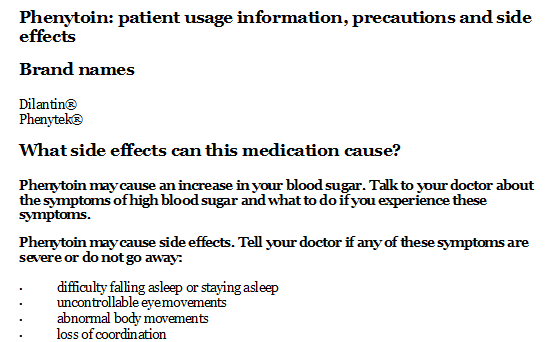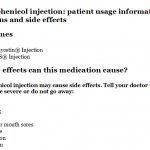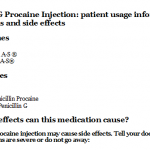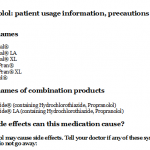
Phenytoin: patient usage information, precautions and side effects
Tuesday, May 30, 2017 by Gregory Van Dyke
http://www.naturalnewsreference.com/2017-05-30-phenytoin-patient-usage-information-precautions-and-side-effects.html

Phenytoin: patient usage information, precautions and side effects
Brand names
Dilantin®
Phenytek®
What side effects can this medication cause?
Phenytoin may cause an increase in your blood sugar. Talk to your doctor about the symptoms of high blood sugar and what to do if you experience these symptoms.
Phenytoin may cause side effects. Tell your doctor if any of these symptoms are severe or do not go away:
-
difficulty falling asleep or staying asleep
-
uncontrollable eye movements
-
abnormal body movements
-
loss of coordination
-
confusion
-
slowed thinking
-
slurred speech
-
dizziness
-
headache
-
constipation
-
unwanted hair growth
-
coarsening of facial features
-
enlargement of lips
-
overgrowth of gums
-
pain or curving of the penis
Some side effects can be serious. If you experience any of the following symptoms, call your doctor immediately:
-
swollen glands
-
blisters
-
joint pain
-
nausea
-
vomiting
-
yellowing of the skin or eyes
-
pain in upper right part of the stomach
-
excessive tiredness
-
unusual bruising or bleeding
-
loss of appetite
-
flu-like symptoms
-
fever, sore throat, rash, mouth ulcers, easy bruising, or facial swelling
Phenytoin may cause other side effects. Call your doctor if you have any unusual problems while you are taking this medication.
If you experience a serious side effect, you or your doctor may send a report to the Food and Drug Administration’s (FDA) MedWatch Adverse Event Reporting program online (http://www.fda.gov/Safety/MedWatch) or by phone (1-800-332-1088).
Taking phenytoin may increase the risk that you will develop osteomalacia (weakening and softening of the bones) and problems with your lymph nodes including Hodgkin’s disease (cancer that begins in the lymph system). Talk to your doctor about the risks of using this medication to treat your condition.
Why is this medication prescribed?
Phenytoin is used to control certain type of seizures, and to treat and prevent seizures that may begin during or after surgery to the brain or nervous system. Phenytoin is in a class of medications called anticonvulsants. It works by decreasing abnormal electrical activity in the brain.
How should this medicine be used?
Phenytoin comes as an extended-release (long-acting) capsule, a chewable tablet, and a suspension (liquid) to take by mouth. The chewable tablet and suspension are usually taken two or three times a day. The extended-release capsules are usually taken 1 to 4 times a day. Take phenytoin at around the same time(s) every day. Follow the directions on your prescription label carefully, and ask your doctor or pharmacist to explain any part you do not understand. Take phenytoin exactly as directed. Do not take more or less of it or take it more often than prescribed by your doctor.
Your doctor will start you on a low dose of phenytoin and gradually increase your dose, not more often than once every 7 to 10 days.
Different phenytoin products are absorbed by the body in different ways and cannot be substituted for one another. If you need to switch from one phenytoin product to another, your doctor may need to adjust your dose. Each time you receive your medication, check to be sure that you have received the phenytoin product that was prescribed for you. Ask your pharmacist if you are not sure that you received the right medication.
Shake the liquid well before each use to mix the medication evenly. Use an accurate measuring device to be sure you receive the correct amount of medication. Ask your doctor or pharmacist if you have any questions about how to measure your dose.
Swallow the extended-release capsules whole; do not split, chew, or crush them. Do not take capsules that are discolored.
You may chew the chewable tablets thoroughly before swallowing them, or you may swallow them whole without chewing.
If you are receiving formula or supplements through a feeding tube, talk to your doctor about when you should take phenytoin. You will need to allow some time between receiving your feedings and taking phenytoin.
Phenytoin may help control your condition but will not cure it. Continue to take phenytoin even if you feel well. Do not stop taking phenytoin without talking to your doctor, even if you experience side effects such as unusual changes in behavior or mood. If you suddenly stop taking phenytoin, your seizures may worsen. Your doctor will probably decrease your dose gradually.
Other uses for this medicine
Phenytoin is also used to control irregular heartbeat. Talk to your doctor about the risks of using this medication for your condition.
This medication may be prescribed for other uses; ask your doctor or pharmacist for more information.
What special precautions should I follow?
Before taking phenytoin,
-
tell your doctor and pharmacist if you are allergic to phenytoin, other hydantoin medications such as ethotoin (Peganone) or fosphenytoin (Cerebyx), or any other medications. Also tell your doctor if you are allergic to carbamazepine (Carbatrol, Equetro, Tegretol, others), or if your doctor chose not to treat you with carbamazepine because laboratory testing showed that you have an inherited risk factor that makes it more likely that you will have an allergic reaction to carbamazepine. This risk factor may also increase the chance that you will have an allergic reaction to phenytoin.
-
tell your doctor if you are taking delavirdine (Rescriptor). Your doctor will probably tell you not to take phenytoin if you are taking this medication.
-
tell your doctor and pharmacist what prescription and nonprescription medications, vitamins, nutritional supplements, and herbal products you are taking or plan to take. Be sure to mention any of the following: albendazole (Albenza); amiodarone (Cordarone, Nexterone, Pacerone); anticoagulants (‘blood thinners’) such as warfarin (Coumadin, Jantoven); antifungal medications such as fluconazole (Diflucan), ketoconazole (Nizoral), itraconazole (Onmel, Sporanox), miconazole (Oravig), posaconazole (Noxafil), and voriconazole (Vfend); certain antivirals such as efavirenz (Sustiva, in Atripla), indinavir (Crixivan), lopinavir (in Kaletra), nelfinavir (Viracept), ritonavir (Norvir, in Kaletra), and saquinavir (Invirase); bleomycin; capecitabine (Xeloda); carboplatin; chloramphenicol; chlordiazepoxide (Librium, in Librax); chlorpropamide (Diabinese); cholesterol medications such as atorvastatin (Lipitor, in Caduet), fluvastatin (Lescol), and simvastatin (Zocor, in Vytorin); cisplatin; clozapine (Fazaclo, Versacloz); cyclosporine (Gengraf, Neoral, Sandimmune); diazepam (Valium); digoxin (Lanoxin); disulfiram (Antabuse); doxorubicin (Doxil); doxycycline (Doryx, Vibramycin); fluorouracil; fluoxetine (Prozac, Sarafem, in Symbyax, others); fluvoxamine (Luvox); folic acid; fosamprenavir (Lexiva); furosemide (Lasix); H2 antagonists such as cimetidine (Tagamet), famotidine (Pepcid), nizatidine (Axid), and ranitidine (Zantac); hormonal contraceptives (birth control pills, patches, rings, or injections); hormone replacement therapy (HRT); irinotecan (Camptosar); isoniazid (Laniazid, in Rifamate, in Rifater); medications for mental illness and nausea; other medications for seizures such as carbamazepine (Carbatrol, Equetro, Tegretol, others), ethosuximide (Zarontin), felbamate (Felbatol), lamotrigine (Lamictal), methsuximide (Celontin), oxcarbazepine (Trilepta), phenobarbital, topiramate (Topamax), and valproic acid (Depakene); methadone (Dolophine, Methadose); methotrexate (Otrexup, Rasuvo); methylphenidate (Daytrana, Concerta, Metadate, Ritalin); mexiletine; nifedipine (Adalat, Afeditab), nimodipine (Nymalize), nisoldipine (Sular); omeprazole (Prilosec); oral steroids such as dexamethasone, methylprednisolone (Medrol), prednisolone, and prednisone (Rayos); paclitaxel (Abraxane, Taxol); paroxetine (Paxil, Pexeva); praziquantel (Biltricide); quetiapine (Seroquel); quinidine (in Nuedexta); reserpine ; rifampin (Rifadin, Rimactane, in Rifamate, in Rifater); salicylate pain relievers such as aspirin, choline magnesium trisalicylate, choline salicylate, diflunisal, magnesium salicylate (Doan’s, others), and salsalate; sertraline (Zoloft); sucralfate (Carafate); sulfa antibiotics; teniposide (Vumon); theophylline (Elixophyllin, Theo-24); ticlopidine; tolbutamide; trazodone; verapamil (Calan, Verelan, in Tarka); vigabatrin (Sabril); and vitamin D. Your doctor may need to change the doses of your medications or monitor you more carefully for side effects.
-
tell your doctor if you are taking antacids that contain calcium, magnesium, or aluminum (Maalox, Mylanta, Tums, others). Your doctor may tell you to allow some time to pass between taking the antacid and taking phenytoin.
-
tell your doctor what herbal products you are taking, especially St. John’s wort.
-
tell your doctor if you have ever developed a liver problem while taking phenytoin. Your doctor will probably tell you not to take phenytoin again.
-
tell your doctor if you drink or have ever drunk large amounts of alcohol and if you have or have ever had diabetes, porphyria (condition in which certain natural substances build up in the body and may cause stomach pain, changes in thinking or behavior, or other symptoms), or kidney or liver disease.
-
tell your doctor if you are pregnant, plan to become pregnant, or are breastfeeding. You should not become pregnant while you are taking phenytoin. Talk to your doctor about effective birth control methods that you can use during your treatment. If you become pregnant while taking phenytoin, call your doctor. Phenytoin may harm the fetus.
-
if you are having surgery, including dental surgery, tell the doctor or dentist that you are taking phenytoin.
-
you should know that this medication may cause dizziness and problems with coordination. Do not drive a car or operate machinery until you know how this medication affects you.
-
talk to your doctor about the safe use of alcohol while you are taking this medication.
-
you should know that your mental health may change in unexpected ways and you may become suicidal (thinking about harming or killing yourself or planning or trying to do so) while you are taking phenytoin. A small number of adults and children 5 years of age and older (about 1 in 500 people) who took anticonvulsants such as phenytoin to treat various conditions during clinical studies became suicidal during their treatment. Some of these people developed suicidal thoughts and behavior as early as one week after they started taking the medication. There is a risk that you may experience changes in your mental health if you take an anticonvulsant medication such as phenytoin, but there may also be a risk that you will experience changes in your mental health if your condition is not treated. You and your doctor will decide whether the risks of taking an anticonvulsant medication are greater than the risks of not taking the medication. You, your family, or your caregiver should call your doctor right away if you experience any of the following symptoms: panic attacks; agitation or restlessness; new or worsening irritability, anxiety, or depression; acting on dangerous impulses; difficulty falling or staying asleep; aggressive, angry, or violent behavior; mania (frenzied, abnormally excited mood); talking or thinking about wanting to hurt yourself or to end your life; withdrawing from friends and family; preoccupation with death and dying; giving away prized possessions; or any other unusual changes in behavior or mood. Be sure that your family or caregiver knows which symptoms may be serious so they can call the doctor if you are unable to seek treatment on your own.
-
talk to your doctor about the best way to care for your teeth, gums, and mouth during your treatment with phenytoin. It is very important that you care for your mouth properly to decrease the risk of gum damage caused by phenytoin.
What special dietary instructions should I follow?
Unless your doctor tells you otherwise, continue your normal diet.
What should I do if I forget a dose?
Take the missed dose as soon as you remember it. However, if it is almost time for the next dose, skip the missed dose and continue your regular dosing schedule. Do not take a double dose to make up for a missed one.
What should I know about storage and disposal of this medication?
Keep this medication in the container it came in, tightly closed, and out of reach of children. Store it at room temperature, away from light and excess heat and moisture (not in the bathroom). Do not freeze the liquid.
Unneeded medications should be disposed of in special ways to ensure that pets, children, and other people cannot consume them. However, you should not flush this medication down the toilet. Instead, the best way to dispose of your medication is through a medicine take-back program. Talk to your pharmacist or contact your local garbage/recycling department to learn about take-back programs in your community. See the FDA’s Safe Disposal of Medicines website (http://goo.gl/c4Rm4p) for more information if you do not have access to a take-back program.
In case of emergency/overdose
In case of overdose, call your local poison control center at 1-800-222-1222. If the victim has collapsed or is not breathing, call local emergency services at 911.
Symptoms of overdose may include the following:
-
uncontrollable eye movements
-
loss of coordination
-
slow or slurred speech
-
uncontrollable shaking of a part of the body
-
nausea
-
vomiting
-
difficulty understanding reality
-
coma (loss of consciousness for a period of time)
What other information should I know?
Keep all appointments with your doctor and the laboratory. Your doctor may order certain lab tests to check your response to phenytoin.
Before having any laboratory test, tell your doctor and the laboratory personnel that you are taking phenytoin.
Do not let anyone else take your medication. Ask your pharmacist any questions you have about refilling your prescription.
It is important for you to keep a written list of all of the prescription and nonprescription (over-the-counter) medicines you are taking, as well as any products such as vitamins, minerals, or other dietary supplements. You should bring this list with you each time you visit a doctor or if you are admitted to a hospital. It is also important information to carry with you in case of emergencies.
Why is this medication prescribed?
How should this medicine be used?
What special precautions should I follow?
What special dietary instructions should I follow?
What should I do if I forget a dose?
What side effects can this medication cause?
What should I know about storage and disposal of this medication?
Tagged Under: Tags: chemical medicine, medication, Pharma, Prescription Medicine





